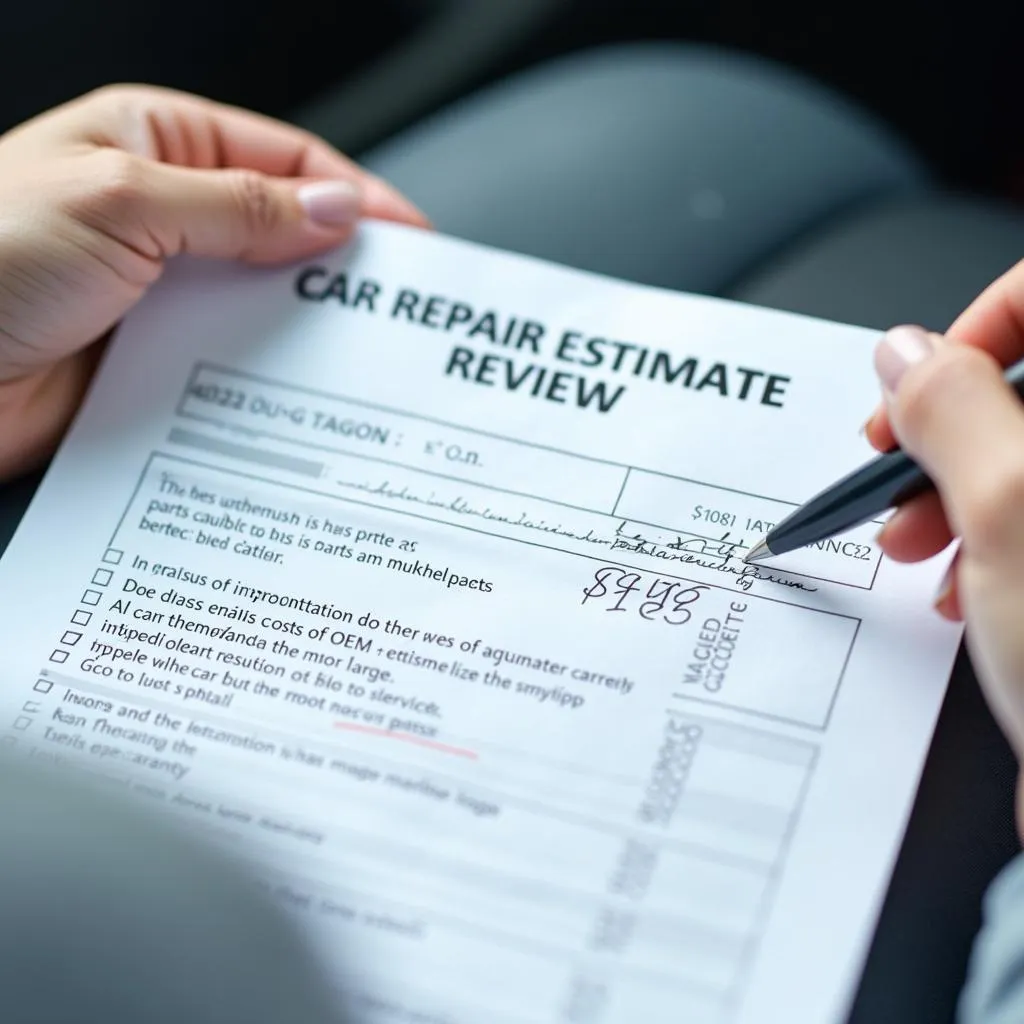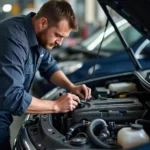Getting your car serviced can feel like navigating a minefield, especially if you’re not familiar with the ins and outs of the automotive world. “How To Not Get Screwed On Auto Car Service” is a question many car owners ask themselves, dreading the potential for unnecessary repairs and inflated bills. But don’t worry, arming yourself with the right knowledge can save you a lot of stress and money in the long run.
 Checking a car repair estimate with a checklist
Checking a car repair estimate with a checklist
Understanding Common Auto Service Scams
Before we dive into prevention, let’s expose some common tactics used to inflate your bill:
- The “Necessary” Repair: This is when a mechanic recommends a repair that’s not actually crucial, often using technical jargon to confuse you.
- The Parts Markup: Mechanics may charge significantly more for parts than their actual cost.
- The Labor Overcharge: This involves inflating the hours spent on a repair job to increase your bill.
 Mechanic explaining car issues using a tablet
Mechanic explaining car issues using a tablet
Prevention is Key: How to Avoid Getting Ripped Off
- Do Your Research: Before choosing a mechanic or repair shop, look for online reviews, ask for recommendations from friends and family, and compare prices.
- Get a Second Opinion: Don’t hesitate to get a second opinion from another mechanic, especially for major repairs. This can help you verify the necessity of the repair and compare costs.
- Ask for a Written Estimate: Always request a written estimate before any work is done. This document should clearly outline all repairs, parts, and labor costs.
- Understand Your Warranty: Familiarize yourself with your car’s warranty, as it may cover certain repairs or parts replacements.
- Learn Basic Car Maintenance: Knowing how to perform basic maintenance tasks, like checking fluids and tire pressure, can help you catch potential problems early on and prevent bigger issues down the road.
 Car owner asking questions to a mechanic
Car owner asking questions to a mechanic
Speak Their Language: Essential Car Terms You Should Know
- OEM (Original Equipment Manufacturer): These are parts made by the original car manufacturer, often considered higher quality than aftermarket options.
- Aftermarket Parts: These are parts made by third-party companies. While they can be more affordable, their quality can vary.
- Diagnostic Fee: This is the fee charged to diagnose the problem with your car. Ask beforehand if this fee will be applied to the cost of the repair if you choose to have it fixed at that shop.
- Labor Rate: This is the hourly rate charged for labor. Rates can vary depending on the shop’s location and expertise.
Protecting Yourself: Red Flags to Watch Out For
- Pressure Tactics: Be wary of mechanics who try to pressure you into immediate repairs without giving you time to consider your options.
- Unclear Explanations: If a mechanic can’t or won’t explain the repairs in terms you understand, it could be a red flag.
- Lack of Transparency: Be cautious of shops that are reluctant to show you the damaged parts or provide detailed invoices.
Conclusion
By being proactive, informed, and assertive, you can navigate the world of auto car service with confidence and avoid getting ripped off. Remember, knowledge is power, and in this case, it can save you a significant amount of money and hassle. Don’t be afraid to ask questions, get second opinions, and stand your ground when it comes to your car’s well-being and your wallet’s health.


